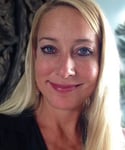A guest post by Bonnie Bright, Ph.D.
What happens when the gods come calling, from a depth psychological perspective, and how can one be ready when it happens? These are questions that arose when I recently sat down with Dr. Jennifer Selig to discuss her upcoming Salon on January 22, 2016, at Pacifica’s Ladera Lane Campus: “The Right Address: How to Be Home When the Gods Come Calling.”
 The title of Selig’s presentation is based on the double meaning of the word “address.” Not only can the word mean a physical “address” where you live or work— where you can typically be found—it’s verb form, while pronounced differently, signifies when someone calls you. “Calling” ties to the word “vocation,” which is based on the Latin vocatus, the past tense of vocare, “to call.” Vocation, from the early 15th century is defined as “spiritual calling.” Thus the word “vocation,” Selig notes, literally means to be called by the gods.
The title of Selig’s presentation is based on the double meaning of the word “address.” Not only can the word mean a physical “address” where you live or work— where you can typically be found—it’s verb form, while pronounced differently, signifies when someone calls you. “Calling” ties to the word “vocation,” which is based on the Latin vocatus, the past tense of vocare, “to call.” Vocation, from the early 15th century is defined as “spiritual calling.” Thus the word “vocation,” Selig notes, literally means to be called by the gods.
One’s vocation, as it turns out, is not as much about what we want to do as it is about where the gods would have us be based on the gifts they have bestowed on us.
In his book, The Soul’s Code: In Search of Character and Calling, Hillman wrote, “We dull our lives by how we conceive them,” Selig reminded me, so vocation—or calling—is the place where we ultimately express the gifts and talents that come through us but are not necessarily of us; not restricted or constrained by our limited egoic perspective.
While a vocational school in contemporary culture is perceived to have a very narrow focus on teaching someone a specific trade they can practice in a fairly short period of time, Selig wants to take the word “vocation” back from that narrow perception. All of our lives are a vocation, no matter what kind of work we do in the world, she insists. For that reason, Pacifica is a true vocational school, opening students to the gifts that are wanting to come through them. Selig has noticed that very often, people are called to come to Pacifica without knowing why. They often step onto the campus and have a feeling of being home.
There are many ways of looking at and discerning what’s calling us. It is important as one leans toward their vocation to trust emotion and affect the body is one way of finding your calling. If you pay attention to where you feel the most energy in your work life; where you have the most joy, you can notice where the calling is strong. Myths, dreams, ritual, and synchronicity also show us paths and patterns. Selig points to works from some of the great pioneers of depth psychology, including Freud, Jung, Hillman, and Marion Woodman, to help point the way as we address questions around vocation.
Perhaps the most important thing to discerning calling is paying attention. James Hillman calls attention the cardinal virtue of depth psychology, Selig points out, noting that she has done some writing on that topic and believes it is crucial to pay attention to both the rational and the irrational—both using the brain for the rational or logos perspective, but also to plumb the irrational in the form of dreams, myth, story and image. It goes both ways, she insists: there needs to be balance of both the day and night worlds; the logos and the eros.
Is finding balance a fantasy, though? Selig suggests that rather than simply seeking balance, learning to live with the tensions that are inherent in our lives is tantamount to pursuing the call. For example, she asks, “How do we hold the tension between what “makes our heart sing” and having to pay the bills?”
“Yes!” I think, when she asks me this. Jung would have agreed: holding the tension allows a space to emerge in which a new thing can arise—the transcendent function at its best. Does holding the tension, then, open the way so that we are paying attention enough to hear the knock when it comes at our door? Suddenly I find myself I looking very much forward to learning more at Jennifer’s Salon presentation on January 22. Who will come knocking there...?
Click here to listen to the full audio interview with Dr. Jennifer Selig.
Sources Hillman, James. (1996). The Soul’s Code: In Search of Character and Calling. New York, NY: Random House, p. 5.
vocation. Online Etymology Dictionary
 Jennifer Selig, Ph.D. is founding chair of Pacifica's Jungian and Archetypal Studies Specialization and the M.A. Engaged Humanities and the Creative Life Program. Dr. Selig currently teaches in both programs, is a published author of many books including Integration: The Psychology and Mythology of Martin Luther King, Jr. and His (Unfinished) Therapy with the Soul of America; a photographer; and writer of non-fiction and screenplays.
Jennifer Selig, Ph.D. is founding chair of Pacifica's Jungian and Archetypal Studies Specialization and the M.A. Engaged Humanities and the Creative Life Program. Dr. Selig currently teaches in both programs, is a published author of many books including Integration: The Psychology and Mythology of Martin Luther King, Jr. and His (Unfinished) Therapy with the Soul of America; a photographer; and writer of non-fiction and screenplays.
 Bonnie Bright, Ph.D., graduated from Pacifica’s Depth Psychology program after defending her dissertation in December 2014. She is the founder of Depth Psychology Alliance, a free online community for everyone interested in depth psychologies, and of DepthList.com, a free-to-search database of Jungian and depth psychology-oriented practitioners. She is also the creator and executive editor of Depth Insights, a semi-annual scholarly journal, and regularly produces audio and video interviews on depth psychological topics. Bonnie has completed 2-year certifications in Archetypal Pattern Analysis via the Assisi Institute; in Technologies of the Sacred with West African elder Malidoma Somé, and has been extensively involved in Holotropic Breathwork™ and the Enneagram.
Bonnie Bright, Ph.D., graduated from Pacifica’s Depth Psychology program after defending her dissertation in December 2014. She is the founder of Depth Psychology Alliance, a free online community for everyone interested in depth psychologies, and of DepthList.com, a free-to-search database of Jungian and depth psychology-oriented practitioners. She is also the creator and executive editor of Depth Insights, a semi-annual scholarly journal, and regularly produces audio and video interviews on depth psychological topics. Bonnie has completed 2-year certifications in Archetypal Pattern Analysis via the Assisi Institute; in Technologies of the Sacred with West African elder Malidoma Somé, and has been extensively involved in Holotropic Breathwork™ and the Enneagram.



